Further New Discoveries Have Been Made On My Theory.

Further new discoveries have been made on my theory.
More Posts from Underhill2 and Others
I mean, yes, a lot of horror media boils down to “wouldn’t it be fucked up?”, but let’s not be reductive – there are several distinct subgenres of “wouldn’t it be fucked up?”, including but not limited to:
Proposing a very improbable situation, then gesturing toward it and asking “man, wouldn’t this be fucked up?”
Wildly exaggerating an everyday state of affairs in order to demonstrate that it was, in fact, always fucked up.
Taking a thing that it’s broadly agreed is fucked up and making it a different kind of fucked up.
Inventing a new type of guy, then pointing at the guy and going “this guy is fucked up.”
Grabbing the audience by the shoulders like, no, man, the fucked up thing is, like, a metaphor. For a different thing. That is also fucked up.
Taking a genuinely innocuous situation and through some unlikely contrivance rendering it fucked up.
Making a thing that self-referentially gestures at itself and asks “isn’t it fucked up that this is so fucked up?”
Framing a fantastical scenario and asking “is this fucked up? why is it fucked up? what does it mean to be fucked up? what is ‘fucked’? what is ‘up’?”
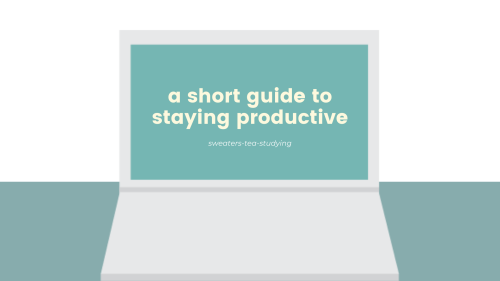
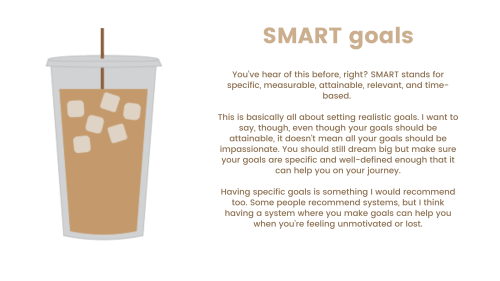
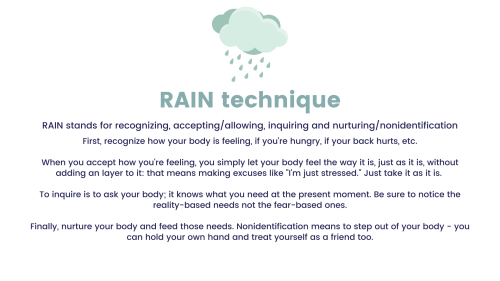
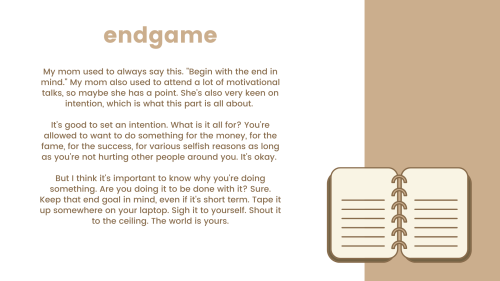
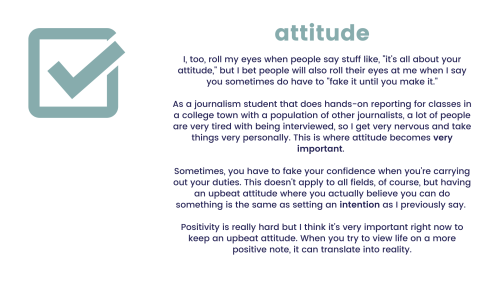
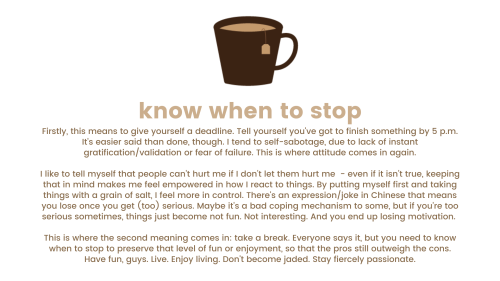
042420
As most people are working and studying from home right now, I wanted to share some concrete, implementable ways you can help yourself feel better. Though I believe productivity and quantity of work done (or lack thereof) doesn’t/shouldn’t translate into your self-worth and how you view yourself, when you get work done, you actually do feel better in your own body.
By the way, it’s the first time I’m formatting a tips/guide post like this, so I apologize that I couldn’t be more concise.
I’ve spoken to a licensed professional counsellor as well as to some professionals who have been working from home for a long time, and some of the advice above is from them. I’m also sharing from my own experience as someone who used to be very productive and an (ex-)overachiever, and still attach a lot of my self-worth to grades and other tangible accomplishments. I hope these slides can help you. In case it’s hard to read, I’ve included it (reworded) in text form if you’d like to read more.
Keep reading
reasons to live: winter edition
cold and crisp air making you feel alive
your breath freezing and the wind making your skin tight
pitch black nights
heavy snowfall making even the ugliest landscapes breathtakingly beautiful
wrapping yourself in a huge blanket to keep yourself warm
frozen cold hands against your bare skin
ugly sweaters and fuzzy socks
hot chocolate after a long time out in the cold
the warmth and comfort you’ll experience due to increasing intimacy
christmas and the joy of giving
less partying and more intimate movie nights with your loved ones
the hundreds of blankets you’ll end up sleeping with
the smell of something freshly baked filling the entire house
the goose bumps you’ll notice everywhere on your body
when someone loves you - really loves you - treat them gently. text your best friend back when you can. tell your mother you noticed her haircut and that she was right about that recipe. tell your grandfather that the boats in his bottles are the best things you’ve ever seen. be good to the people who are good to you. it’s the least you can do.
i honestly think the reason the most bitter and disgruntled people make sweet and cutesy art while horror writers tend to be upbeat and chipper people is that in order to write good horror you need a certain amount of healing and emotional growth that allows you to access the theraputic techniques used in horror to stimulate fear and to then turn around and present it to others. and on the flipside, there is nothing more heartbreaking and raw than to make art of the joy you wish you could still feel
Do u have any advice on studying a subject that you really can't understand? (Chemistry in my case)
HOW TO STUDY A DIFFICULT SUBJECT?
STEP ONE, ALWAYS, is MINDSET.
Eliminate “can’t understand” from your vocabulary. Transform it to “will find out”. This way you open your mind to accepting new information, without it hitting the wall inside your mind that would have said, “Can’t. It’s too much. It’s too difficult.”
Appreciate the fact that you get the opportunity to learn the amazing science to know the world at an elemental level.
Remember that no one is born with knowledge, we all learn it, some topics just take a little longer, esp if were aren’t that familiar with the related concepts. Don’t compare the fact that others in your class are learning things at a different speed. Because you’re living your own journey. You’re in a lane of your own.
So allow yourself to spend extra time exploring the topic. There are two parts to learning: understanding and memorising. This helps with the understanding.
Familiarise yourself with the concept from various points of view, not just the way the teacher is teaching it. Because often the way you are taught something can make something seem more difficult, vs a teacher who really takes the time to make it seem easy.
Take the time to learn the basics.
Find other ways to learn the same info. Have multiple sources of info: YOUTUBE (helped me personally), textbooks, google the topic.
Ask a fellow student who knows it better and ask them to talk about some of the points with you.
Relate what you learn and see how they impact and exist in the real world - turn it more practical, beyond theory. Connect it with other disciplines.
Read the textbook - slowly. Give yourself time to understand it esp the early paragraphs
Practice the questions at your own pace allowing yourself to see how it works.

ap classes can be super stressful, especially if you’re taking multiple. here’s the best advice i have on being successful in them after surviving high school! also, please feel free to add any advice in the reblogs or comments<3 thank you!
• read your textbook (and take notes!!) i quickly learned that i did so much better in a class when i had done the textbook readings for each chapter. usually teachers go about a chapter a week, which isn’t super tough to keep up with if you divide it into chunks (i’ll make a post soon on how i took notes from the textbook)
• do your homework, and do it well. some nights, your homework will be a lot. but you really should do as much of it as you can. (i’m emphasizing this for math classes because math homework is usually super similar to what you’ll see on the test, but it is important review for every class). Work with the book next to you, use khan academy, mark questions that you need help with (and get help), and do it on time. your grades will thank you, and so will your teacher!!
• my strategy to review for in class tests:
1.) review vocabulary using flash cards or quizlet (i’d actually recommend making quizlets for each chapter so u can use it to review for the ap test later)
2.) use your notes or textbook summaries to create your own summaries of the current chapter(s) on blank pieces of paper (take notes on your notes, explain important concepts/main ideas, write down important dates/people/equations, include practice problems for math/science courses) (keep these summary pages in a folder & organized for when you’re reviewing for the ap test)
3.) know how to explain all of the concepts (either out loud or in writing) without looking at the textbook for answers. (i usually try to answer the textbook’s essential questions/ section questions using as much concrete evidence as possible to prove the answer)
(do this over 3 separate days AT LEAST for in class tests (day one vocab, day two create summaries of chapters, day three explain chapters outloud), and over several weeks for the ap test)
• DO! NOT! PROCRASTINATE!
literally everyone says this, but seriously do not procrastinate and high school won’t be as miserable for you as it is for other people. do your homework on time, divide your note taking into different days, plan ahead, do work right as you get home or during class.
• talk to your teacher if you’re seriously struggling with the work load, and let them know if you’re going through a hard time in life and it’s affecting your school work. this can be scary, but usually they don’t want you to want to die! so just let them know, and they’ll give you advice / help with it and will support you. communication is so important.
possible structure for an email to communicate an issue with them:
“hi _____(teachers name)_____,
i’m having a hard time completing my work recently because of (reason why, be honest). is it okay if i can have an extension until (date in the near future that you can turn it in and please stick to this date btw) (please)?
thank you, __(your name)__”
(just for more explanation: my dog died in march during my senior year. i emailed my ap environmental science teacher, my ap statistics teacher, and my ap lit teacher the same email: “hi, my dog died today and i’m having a hard time concentrating on my work, so i won’t be able to finish it today. may i have an extension for my work this week until (day i knew i could turn it in abt a week later)? thank you! -jillian” they all were understanding and gave me an extension. i said the same thing when my aunt died, and the same thing when i was in the hospital after a long boarding accident. i also let teachers know during junior year when i was having anxiety, or during first sem senior year when i was working heavy hours)
• limit the amount of ap classes you take, and only take classes that you’re interested in. i know colleges “like ap classes,” but they also like mentally sane students, students that sleep, well rounded students, students with decent gpas, etc. just in my opinion, you’ll be so much happier and more successful if you only take 1-3 ap classes that you’re truly interested in. (i took 1 my sophomore year, 3 junior year, and 3 senior year. my rule was to never take more than 3 because that’s the most that i could still get all a’s in without suffering. but know yourself and your limits)

To help move away from summary and toward ANALYSIS, it’s important to incorporate strong verbs into your writing when discussing the writer’s rhetorical choices. Below is a list of verbs that are considered weak (imply summary) and a list of verbs that are considered strong (imply analysis). Strive to use the stronger verbs in your essays to help push yourself away from summary and toward analysis: ex “The writer flatters…” NOT “The writer says…”
Weak Verbs (Summary):
says
explains
relates
states
goes on to say
shows
tells
this quote shows
Strong Verbs (Analysis):
Argues, admonishes, analyzes, compares, contrasts, defines, demonizes, denigrates, describes, dismisses, enumerate, expounds, emphasizes, establishes, flatters, implies, lionizes, lists, minimizes, narrates, praises, processes, qualifies, questions, ridicules, suggests, supports, trivializes, vilifies, warns
Powerful and Meaningful Verbs to Use in an Analysis (Alternatives to Show):
Acknowledge, Address, Analyze, Apply, Argue, Assert, Augment
Broaden
Calculate, Capitalize, Characterize, Claim, Clarify,Compare, Complicate, Confine, Connect, Consider, Construct, Contradict, Correct, Create, Convince, Critique
Declare, Deduce, Defend, Demonstrate, Deny, Describe, Determine, Differentiate, Disagree, Discard, Discover, Discuss, Dismiss, Distinguish, Duplicate
Elaborate, Emphasize, Employ, Enable, Engage, Enhance, Establish, Evaluate, Exacerbate, Examine, Exclude, Exhibit, Expand, Explain, Exploit, Express, Extend
Facilitate, Feature, Forecast, Formulate, Fracture
Generalize, Group, Guide
Hamper, Hypothesize
Identify, Illuminate, Illustrate, Impair, Implement, Implicate, Imply, Improve, Include, Incorporate, Indicate, Induce, Initiate, Inquire, Instigate, Integrate, Interpret, Intervene, Invert, Isolate
Justify
Locate, Loosen
Maintain, Manifest, Manipulate, Measure, Merge, Minimize, Modify, Monitor
Necessitate, Negate, Nullify
Obscure, Observe, Obtain, Offer, Omit, Optimize, Organize, Outline, Overstate
Persist, Point out, Possess, Predict, Present, Probe, Produce, Promote, Propose, Prove, Provide
Qualify, Quantify, Question
Realize, Recommend, Reconstruct, Redefine, Reduce, Refer, Reference, Refine, Reflect, Refute, Regard, Reject, Relate, Rely, Remove, Repair, Report, Represent, Resolve, Retrieve, Reveal, Revise
Separate, Shape, Signify, Simulate, Solve, Specify, Structure, Suggest, Summarize, Support, Suspend, Sustain
Tailor, Terminate, Testify, Theorize, Translate
Undermine, Understand, Unify, Utilize
Validate, Vary, View, Vindicate
Yield
self discipline tips
here are tips I discovered very recently:
something is better than nothing. 5 minutes of work are better than zero. Just because you missed something on your schedule doesn’t mean you can’t still work on it, even for 5 minutes. Grow and build on this.
second drafts / reviews can be done after.
Don’t think you are going to do your very best work on the first try. Take the weight of perfectionism off your shoulders.
don’t think about doing it. just do it as fast as you can.
build on your productivity, not your failures.
If you come from a past of procrastinating and now feel motivated to change and discipline yourself, do NOT try to do everything at once.
if you have a set of different goals to accomplish, begin with the most important one. Wait until the rotine of working for that one settles in (you feel productive and comfortable-ish), and then begin with the next. Repeat.
this way you’ll be building your way up and not juggling everything at the same time, hoping everything works out.
be patient with yourself, you’ll get there!
set smaller deadlines for your goals
have monthly and weekly-ish deadlines
e.g. if you are doing a project, due 22nd Feb, set personal deadlines, like have Introduction written by 2nd Feb, have Methods written by 10th Feb, have project complete by 18th Feb.
take them as seriously as you possibly can, don’t miss out on yourself.
write realistic daily tasks and don’t stop until you finish them. after them you can do whatever you want
on writing realistic daily tasks, the secret is knowing you can only do so much in one day, but trusting you can accomplish everything in the course of any period of time (a week, or 2 weeks or a month, etc.) because you will combine the work from all these different days.
it’s very tempting to write down all the tasks you need to accomplish in one day to just get over with it, but the real deal is you won’t accomplish half of them. You’ll feel very unproductive then, wich leads to demotivation.
spread daily tasks in the time necessary.
have a consistent sleep schedule.
if your mind isn’t ready everything will fall apart.
have one rest day per week where you plan nothing, do whatever you want except studying. this can be harder than you expect!
(don’t forget these are effective only if you actually put them into practice! good luck babes!!)
how i handle my workload
first i review what i’d learned most recently (this is usually quick, but i say everything out loud and repeat terms/concepts i don’t understand)
I do this by either rewriting the notes (handwritten), flashcards, or by going through the study sheet provided (this won’t always be given)
second i work on any essays/assignments that i have to do, priority goes to those due the soonest or the ones that are the most difficult
finally i review for any upcoming tests/labs that i may have, priority goes to those that occur the soonest or are the most difficult (i do this by reviewing my notes, flashcards, power points, studying with friends, or using a study guide)
TIPS
Ask classmates questions about the topic, don’t be afraid of looking dumb - they are in the same position as you
If you didn’t get a study guide, make one yourself! It can be a great study tool, maybe even more effective than one created by a teacher
Don’t cram. Just, don’t.
-
 rydonthorn reblogged this · 1 week ago
rydonthorn reblogged this · 1 week ago -
 kalvleppikeisamrofni reblogged this · 1 week ago
kalvleppikeisamrofni reblogged this · 1 week ago -
 anomalousrobot reblogged this · 1 week ago
anomalousrobot reblogged this · 1 week ago -
 anomalousrobot liked this · 1 week ago
anomalousrobot liked this · 1 week ago -
 mx-seraph reblogged this · 1 week ago
mx-seraph reblogged this · 1 week ago -
 caprisunmom liked this · 1 week ago
caprisunmom liked this · 1 week ago -
 oddacitea reblogged this · 2 weeks ago
oddacitea reblogged this · 2 weeks ago -
 bruhhchanvenever liked this · 2 weeks ago
bruhhchanvenever liked this · 2 weeks ago -
 depths-of-misery reblogged this · 2 weeks ago
depths-of-misery reblogged this · 2 weeks ago -
 wtrotsky-blog liked this · 2 weeks ago
wtrotsky-blog liked this · 2 weeks ago -
 antheliia reblogged this · 2 weeks ago
antheliia reblogged this · 2 weeks ago -
 argentis reblogged this · 2 weeks ago
argentis reblogged this · 2 weeks ago -
 bootieshunter reblogged this · 2 weeks ago
bootieshunter reblogged this · 2 weeks ago -
 prettylittlepasha reblogged this · 2 weeks ago
prettylittlepasha reblogged this · 2 weeks ago -
 des-poina liked this · 2 weeks ago
des-poina liked this · 2 weeks ago -
 thewolfprince liked this · 2 weeks ago
thewolfprince liked this · 2 weeks ago -
 saberamane reblogged this · 2 weeks ago
saberamane reblogged this · 2 weeks ago -
 saberamane liked this · 2 weeks ago
saberamane liked this · 2 weeks ago -
 tolonar liked this · 2 weeks ago
tolonar liked this · 2 weeks ago -
 crunchyveganabacus liked this · 2 weeks ago
crunchyveganabacus liked this · 2 weeks ago -
 desuex reblogged this · 2 weeks ago
desuex reblogged this · 2 weeks ago -
 gorbond liked this · 2 weeks ago
gorbond liked this · 2 weeks ago -
 conflagrationamalgamation reblogged this · 3 weeks ago
conflagrationamalgamation reblogged this · 3 weeks ago -
 the-unknown-wanderer liked this · 3 weeks ago
the-unknown-wanderer liked this · 3 weeks ago -
 ablokk liked this · 3 weeks ago
ablokk liked this · 3 weeks ago -
 tanilealto liked this · 3 weeks ago
tanilealto liked this · 3 weeks ago -
 archarmadillo reblogged this · 3 weeks ago
archarmadillo reblogged this · 3 weeks ago -
 archarmadillo liked this · 3 weeks ago
archarmadillo liked this · 3 weeks ago -
 selflovejolteon reblogged this · 3 weeks ago
selflovejolteon reblogged this · 3 weeks ago -
 not-dead-just-hopeful reblogged this · 3 weeks ago
not-dead-just-hopeful reblogged this · 3 weeks ago -
 not-dead-just-hopeful liked this · 3 weeks ago
not-dead-just-hopeful liked this · 3 weeks ago -
 fuelingobsessions liked this · 3 weeks ago
fuelingobsessions liked this · 3 weeks ago -
 i-am-a-yellow-rubber-ducky liked this · 3 weeks ago
i-am-a-yellow-rubber-ducky liked this · 3 weeks ago -
 electronicdinosaurgladiator reblogged this · 3 weeks ago
electronicdinosaurgladiator reblogged this · 3 weeks ago -
 misterbisworld liked this · 3 weeks ago
misterbisworld liked this · 3 weeks ago -
 conflagrationamalgamation liked this · 3 weeks ago
conflagrationamalgamation liked this · 3 weeks ago -
 roseflower-hunter reblogged this · 3 weeks ago
roseflower-hunter reblogged this · 3 weeks ago -
 rowanhorserider liked this · 3 weeks ago
rowanhorserider liked this · 3 weeks ago -
 doom371 liked this · 3 weeks ago
doom371 liked this · 3 weeks ago -
 plasmoidal reblogged this · 3 weeks ago
plasmoidal reblogged this · 3 weeks ago -
 spacemash reblogged this · 3 weeks ago
spacemash reblogged this · 3 weeks ago -
 whollyunnecessary liked this · 3 weeks ago
whollyunnecessary liked this · 3 weeks ago -
 experiencecase reblogged this · 3 weeks ago
experiencecase reblogged this · 3 weeks ago -
 spurious liked this · 3 weeks ago
spurious liked this · 3 weeks ago -
 spockvarietyhour reblogged this · 3 weeks ago
spockvarietyhour reblogged this · 3 weeks ago -
 spockvarietyhour liked this · 3 weeks ago
spockvarietyhour liked this · 3 weeks ago -
 eleftherian reblogged this · 3 weeks ago
eleftherian reblogged this · 3 weeks ago -
 persbaderse reblogged this · 3 weeks ago
persbaderse reblogged this · 3 weeks ago -
 persbaderse liked this · 3 weeks ago
persbaderse liked this · 3 weeks ago
